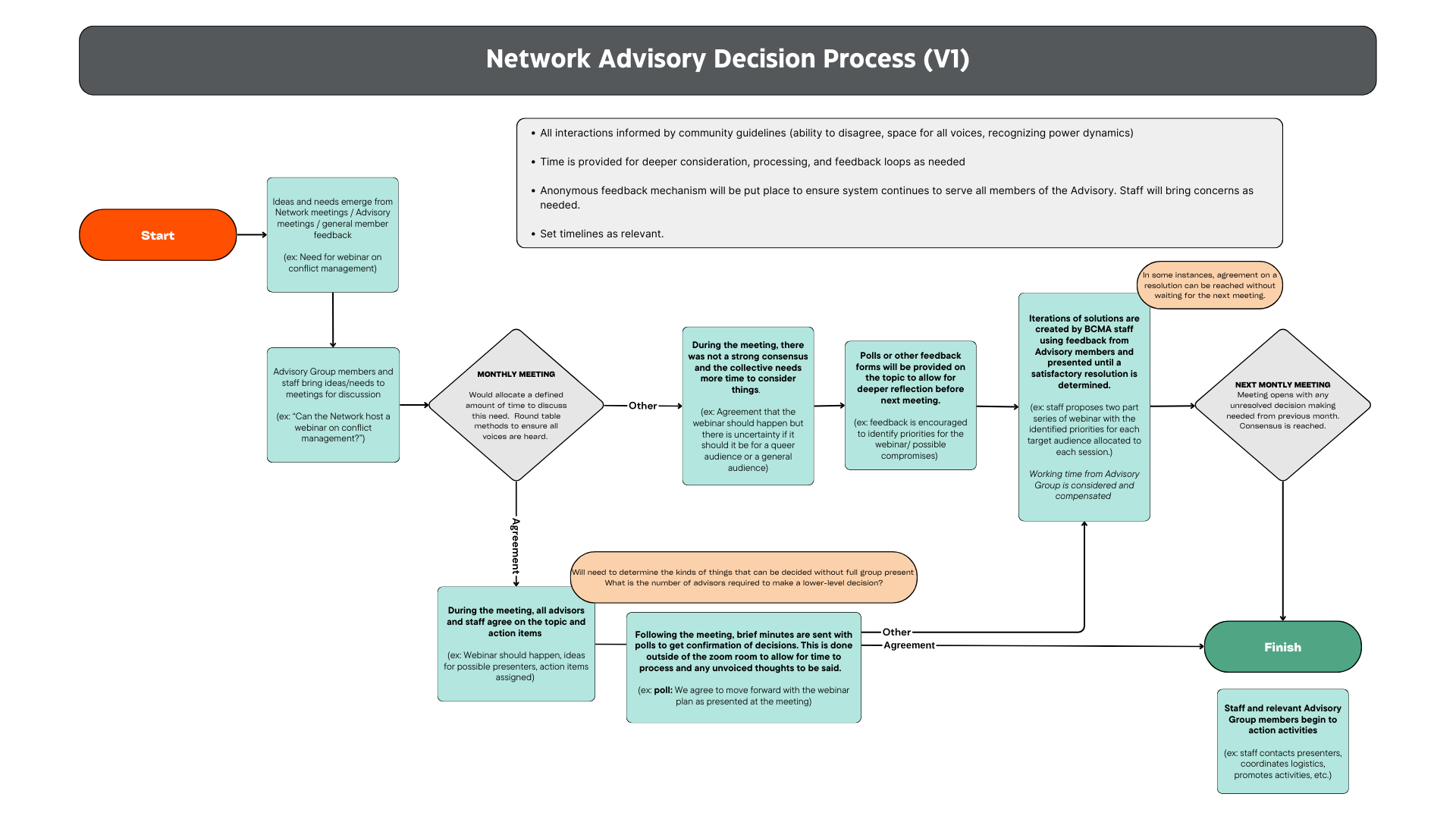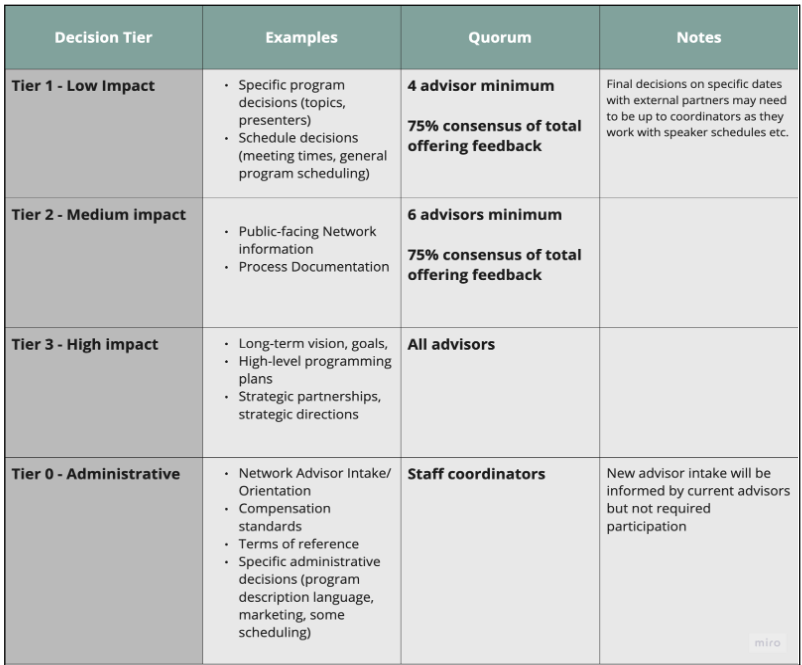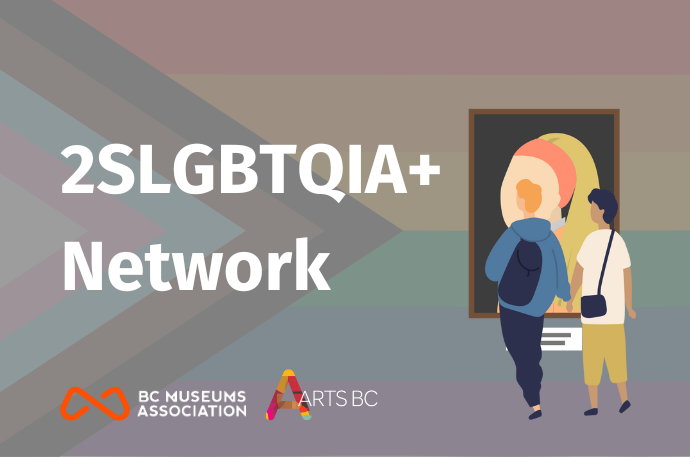2SLGBTQIA+ Network Advisory Guidelines and Process
Community Guidelines Conflict Resolution Code of Conduct Decision Making
About this Document
To facilitate authentic relationship-building and support the emotional wellbeing of our Advisors, the BCMA dedicated three months to the co-creation of process standards prior to any program development for the Network. This includes, but is not limited to: community guidelines, conflict management practices, and non-hierarchical decision making systems.
This document serves as an internal reference to guide behaviours, as well as an externally available resource to ensure public accountability. This is not a formal policy, but is a living document that will evolve as new needs and methods emerge that better serve our community.
If you have questions about our process, please contact us at bcma@museum.bc.ca.
About the 2SLGBTQIA+ Network Advisory
Building on the success of the BCMA’s Gender & Sexuality Toolkit, the BCMA IBPOC Network, and responding to community needs, the 2SLGBTQIA+ Network aims to provide a protected, accountable space where 2SLGBTQIA+ students, volunteers, and professionals in the arts sector can connect. The Network will provide targeted support for members of the queer community, and offer some resources for allies who would like to improve their individual and organisational practices.
Members of the Advisory Group self-identify as 2SLGBTQIA+ museum, heritage, arts, library, or archives student, volunteer, or professionals and bring unique and diverse perspectives to guide the work. They meet monthly with the Network Coordinators (BCMA staff) to guide programming for the 2SLGBTQIA+ Network. Advisory Group discussions will centre around identifying needs and challenges, and how to best support 2SLGBTQIA+ individuals in the sector. The Advisory Group will advise and contribute to the expansion and maintenance of the BCMA 2SLGBTQIA+ Network alongside BCMA staff.
Community Guidelines
Values
Accountable
The Network Advisory will remain mindful of its purpose to support the 2SLGBTQIA+ community in the arts, culture, and heritage sector. All actions will be in alignment with this higher goal. The Network Advisory will strive to create a Protective Space for our members and wider network by prioritising harm prevention and reduction, as well as upholding co-created [Emotional Wellness / Safety Practices] if/when harm is caused.
Compassionate
The Network Advisory approaches the work with compassion and open-mindedness. Advisors will recognize the diverse lived experiences and acknowledge the courage required to take on this work.
Honest
The Network Advisory prioritises honesty and transparency in the work. Interactions are based in authenticity. Network process is presented with transparency to the wider community with systems for anonymous feedback to ensure the Advisory continues to act in the best interest of the Network.
Accessible
The Network Advisory strives to increase accessibility to ensure inclusivity for all. This includes but is not limited to: a larger collective of Advisors to ensure flexibility on attendance, compensated time and contributions, and an awareness of the intersection of queerness and disabilities
Collaborative
The Network Advisory has a foundation in collaborative work, prioritising diverse voices and perspectives. Relationships are non-transactional, non-extractive, and ideas that are developed in the Advisory are not “owned” by the Association.
Guiding Actions and Behaviours
The advisory has identified the following actions and behaviours will help us in upholding the values identified above:
Validating Experiences and Recognizing Power Dynamics
Aligns with Values: Compassionate, Collaborative
The Network Advisory recognizes that lived experiences differ drastically within the community. There will be no hierarchy of experience or education. Power dynamics are recognized and inclusive strategies are established to deter imbalance. (See Advisory Decision Making)
Ability to Disagree
Aligns with Values: Compassionate, Honest, Collaborative
“Find the joy in being wrong.” The Network Advisory aims to create a safer space to disagree with kindness. Process is in place (See [Conflict Management Considerations]) to facilitate accurate and mutual understanding. Disagreements are not a negative or a personal attack, but embody the purpose of a collective advisory and inspire learning.
Respect for Capacity
Aligns with Values: Accessible
The Network Advisory respects the capacity and time of its members. Meetings will have clear objectives for conversations that are specific to the working group.
Recognizing our Gaps in Diversity
Aligns with Values: Accountable, Honest, Collaborative
The Network Advisory recognizes that our group does not represent the full intersectionality and lived experience of the community. Anything identified that could impact an identity/community that is not represented within our group should be shared openly, from a place of curiosity and with the intent of learning more. Advisors aim to (un)learn from Black and Indigenous leaders outside of the advisory meetings as well, and seek out ways to enact solidarity.
Confidentiality
Aligns with Values: Accountable, Compassionate, Honest
The Network Advisory adopts the guiding principle of confidentiality: “What’s learned here, leaves here – what’s shared here stays here.”
Active and Affirming Communication
Aligns with Values: Accessible, Honest, Collaborative
The Network Advisory prioritises active and affirming communication. The group creates space for participation of all members by being mindful when we give space and when we take up space. Levels of participation are not determined by fear or discomfort, but informed by capacity. “Pulse checks” are done at the start of meetings to encourage humanity and identify capacities, energies, accessibility needs, and comfort considerations.
Things We Leave Behind
Egos
Aligns with Values: Collaborative, Compassionate
The Network Advisory recognizes that we each have different strengths based on our experiences. Leaving behind egos allows us to work on our own misconceptions and creates space for everyone to share their experiences, so that we can value each other’s lived experiences and be open-minded to others’ lived realities that don’t match our own. The Advisory challenges hierarchies based on career, and values formal and informal education.
Unkindness
Aligns with Values: Accountable, Compassionate, Honest, Accessible, Collaborative
“If you say you’re queer, you’re queer.” Acknowledging the potential for in-fighting and prejudice within the queer community, the Network Advisory actively identifies the need to leave behind unkindness. Unkindness can look like dismissive attitudes, passive aggression, cliqueyness, and more. Our Advisory has identified a number of actions we can take to avoid cliqueyness in particular at Network events, including: pushing ourselves out of our normal behaviours to ensure that we’re not actively or passively ignoring or diminishing voices that often are silenced; reaching out to communities who have not historically been included, given the space and/or resources to lead, or represented in queer spaces; and recognizing queer erasure within our own community (uplifting intersex, 2Spirit, ace folks, etc).
Perfectionism
Aligns with Values: Compassionate, Accessible
The Network Advisory aims to leave behind fears of rejection, punitive mindsets, and shame. In doing so, we identify that these behaviours all have roots in perfectionism. We aim to approach missteps and mistakes as opportunities to learn, and approach each other with the assumption that we all bring good intentions to the work. When conflict happens, it will be addressed with strategies that align to our identified values.
Conflict Resolution
Anti-Harassment Policy
Personal harassment or discriminatory conduct will not be tolerated. If you experience or witness harassment or discriminatory conduct, we encourage you to reach out to bcma@museum.bc.ca or fill out this form anonymously. The BCMA will carefully review all reports and take appropriate action.
Examples of Harassment and Discriminatory Conduct:
- Threats, acts, or the endorsement of violence, specifically:
- Threats, acts, or the endorsement of racism, sexism, homophobia, transphobia, xenophobia, etc.
- Unwanted physical contact or sexual attention
- Purposefully intimidating, isolating, or destabilizing an individual
- Slander/gossip with the intent of discrediting or embarrassing
- Intentionally devaluing an individual based on their identity
- Intentional outing and/or deliberate disregard for aspects of an individual’s identity. This includes but is not limited to:
- Sustained misgendering
- Use of a rejected or deadname
- Sharing private details of a person’s lived experience without their consent.
Exploring Terms:
Unwanted physical contact
Unwanted physical contact may include continued unwanted close physical proximity if an individual expresses a desire to retain a specific distance due to the ongoing risk of COVID-19.
Identity
A person’s identity includes but is not limited to: race, ethnicity, gender, sexual orientation, religion, socioeconomic status.
Deadname
A deadname is the birth name of a transgender person no longer in use if they have changed their name as part of their gender transition. A rejected name is any name an individual no longer uses. This includes European names that have been rejected in favour of traditional names.
Examples that are NOT Harassment and Discriminatory Conduct:
- “Reverse Racism”
- Reasonable levels of stress, conflict, or disagreements that may arise from the exploration of challenging ideas and perspectives
- Having problematic or oppressive behaviours challenged
- Physical contact between consenting individuals
- Communication of boundaries, including but not limited to:
- An individual’s desire to retain a physical distance due to COVID-19.
- An individual refusing to engage in discussion and/or take on the emotional labour of educating someone about an aspect of their identity or lived experience.
Exploring Terms:
“Reverse Racism”
Explore the phrase “Reverse Racism” and why it doesn’t exist in this blog post from the Canadian Centre for Diversity and Inclusion.
“It’s not my job to educate you.”
Explore the phrase “It’s not my job to educate you” and how you can approach questions and learning with care and consideration.
The Government of Canada provides detailed information on harassment and a tool to guide conference delegates here.
Designated Mediator
In an effort to provide an accountable space for Network participants, the Network Advisory and Coordinators will identify a designated conflict mediator. This individual will be introduced, identifiable, and available before, throughout and after Network activities. This individual will be present to action resolution during sensitive situations. They will also be available during activities to meditate any conflict or infringement on the harassment policy and community guidelines.
Allyship and De-escalation
We’re all in this together. Explore this resource from LinkedIn for tips on how to appropriately intervene if you witness harassment or discriminatory conduct.
“In any given situation involving harassment, bullying, or discrimination, there is a multitude of ways to respond or react. As a bystander, you have the power to create real-deal change.
The 5 D’s of Bystander Intervention can help you navigate the best approach for the specific situation you are witnessing: [Direct, Distract, Delegate, Delay, Document]”
Community minded de-escalation is key. Explore this guide on de-escalation from Right to Be
“Conflict de-escalation is a strategy to prevent people from escalating into violence. It’s designed to help communities protect and take care of each other using an approach that, if successful, can limit or completely eliminate the need for police intervention. This condensed resource, based on Right To Be’s Conflict De-escalation Training, aims to educate bystanders and give you the tools to determine whether you’re the right person to safely de-escalate a conflict.”
Incident Reporting
All reports may be submitted anonymously. The individual issuing the complaint can fill out an online form containing the following information:
- The name of the perpetrator;
- The date, or approximate dates, that the situation that forms the basis of the complaint occurred;
- A description of the complaint and how the situation breaches the Code of Conduct;
- Any information that might substantiate the complaint;
- (OPTIONAL) The name and contact information of the complainant.
Note: Regardless if your report is submitted anonymously, your private information will only be accessible to the designated BCMA coordinator and won’t be shared without your express permission.
If you would like to discuss an incident directly with a BCMA team member, please contact us at bcma@museum.bc.ca or leave us a voicemail at 250-356-5700.
What to expect after reporting an incident:
- Acknowledgement of Receipt, Internal Review
- Network Coordinators will monitor the online form for incident reports and will review all reports within 24 hours of being submitted.
- Note: if you are in an unsafe situation, please reach out to the designated mediator for immediate assistance.
- If your report is not submitted anonymously you may be contacted to acknowledge receipt and/or to request additional information.
- The designated mediator may be contacted to provide swift on-site support as deemed appropriate.
- If an incident is time-sensitive, the Network Coordinators and Designated Mediator may take immediate action to remove the perpetrator from the venue. If they are deemed an unsafe individual, they will not be granted re-entry into the session. An Advisory Group review will take place following the event to determine what additional action will be taken.
- If an incident is not time-sensitive, the Network Coordinators will respond to the incident after the activity has concluded and will enter into a dialogue with the Advisory Group, and the perpetrator to provide resources and education materials in an effort to seek Transformative Justice. If this does not contribute to a resolution, additional action will be taken.
- Advisory Review (As needed):
- After an internal review of the situation, the Network Coordinators may seek guidance from advisory committees and Council to best respond with care and in a manner that reduces harm.
- The BCMA will prioritise education where possible. If this does not contribute to a resolution, further action will be taken.
Consequences
If a Network participant has been deemed to have violated the Harassment Policy / Community Guidelines, the following disciplinary action may be taken:
- The individual may have their activity registration revoked and would not be reimbursed for any registration fees that have already been paid.
- The individual may be prohibited from participating in BCMA online and/or in-person events for a period of time or indefinitely.
Privacy and Confidentiality
All parties to a harassment complaint are expected to respect the privacy and confidentiality of all other parties involved and to limit the discussion of a harassment complaint to those that need to know.
Code of Conduct
The BCMA 2SLGBTQIA+ Network aims to be a protective, accountable space for all our members; as such, we ask that all attendees read and agree to our code of conduct.
Some Network events will be open for anyone to attend, and some will be affinity spaces specifically for self-identified 2SLGBTQIA+ individuals. If an event is specified as an affinity space, we ask that allies kindly step out.
From any of our attendees, we will not tolerate:
- yelling, swearing, name calling, or otherwise violent language
- using language intended to intimidate, shame, or gain power over another person;
- discrimination of any kind including but not limited to: ableism, racism, transphobia, homophobia, xenophobia, islamophobia, anti-semitism, ageism, sexism.
At Network events, if you witness or experience harm, please refer to our incident reporting process.
Exploring Terms:
Accountable Space
Accountability means being responsible for yourself, your intentions, words, and actions. It means entering a space with good intentions, but understanding that aligning your intent with action is the true test of commitment.
Network coordinators aim to support all attendees, resolve misunderstandings, and prioritise transformational justice where possible but reserve the right to remove participants from the event for non-compliance of this code.
If you have any questions, concerns, or comments, please contact community@museum.bc.ca.
Decision Making
These graphics illustrate the current internal reference to guide for how the Network Advisory makes decisions. This is not a formal policy, but is a living document that will evolve as new needs and methods emerge that better serve our community.



